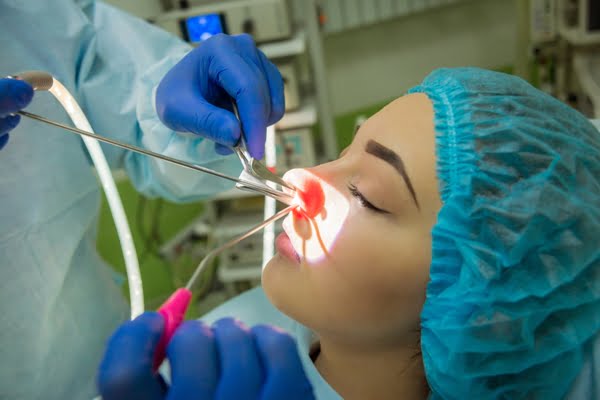Surgical Treatment of Sinusitis
- Updated on: Jun 24, 2024
- 3 min Read
- Published on Jul 30, 2019


Surgical Treatment of Sinusitis
Mostly, the sinusitis infections go away on their own or with the help of medications like antibiotics (bacterial sinusitis), antiviral drugs (viral sinusitis), and antifungal medications (fungal sinusitis). Besides, saline sprays, topical nasal steroids, and over-the-counter (OTC) medicines often give relief. But there are some exceptional cases where sinusitis does not go away without surgery.
Sinus surgery is usually an option if sinusitis is due to a deviated septum, polyps, or other structural problems. The main goals of sinus surgery are to relieve symptoms and cut down on how many infections patients get. If the infections are recurrent, chances are there is something in your nasal cavity that could be fixed only with surgery. Sinus operation should also help a person in breathing better than normal nose breathing. Sinus surgery is also useful in patients whose sense of smell or taste has been affected due to sinus infection.
Sinus operation is mainly done with an intention to remove whatever is blocking the drainage pathways of the sinuses. This may include removing:
- Thin pieces of bone
- Mucous membranes
- Nasal polyps
- Swollen or damaged tissue
- Tumors or growths which block the nasal or sinus passages
Patients usually require sinus surgery to treat a variety of issues like sinusitis and nasal polyps.
Types of Sinus Surgeries
There is one of the most common types of sinus surgery called functional endoscopic sinus surgery (FESS), however, there are also some other procedures that may be carried out.
Functional endoscopic sinus surgery (FESS)
Functional endoscopic sinus surgery (FESS) is a type of sinusitis surgery that is carried out with a tool called an endoscope, which is an illuminated, thin fiber-optic tube. The endoscope is inserted into the nose to reach the sinus openings. Functional Endoscopic Sinus Surgery (FESS) is a common chronic sinusitis surgery in which the surgeon uses a magnifying endoscope to see and remove affected tissue and bone. Before a Functional Endoscopic Sinus Surgery (FESS) is performed, surgeons cut directly into the outside of the face to check the problem and remove it, increasing infection risk and recovery time.
Functional Endoscopic Sinus Surgery (FESS) is a more precise, less invasive method to open the sinuses and help restore you to better health. The entire procedure of Functional Endoscopic Sinus Surgery (FESS) is carried out through the nostrils and leaves little or no scarring. Besides, some swelling may occur, but it will go away quite quickly.
Image-Guided Surgery
Image-guided endoscopic surgery is a newer procedure for treating severe forms of sinus blockages after previous sinus surgeries. In addition to using an endoscope, this type of surgery utilizes a three-dimensional mapping system/procedure to show the position of the surgical instruments to the surgeon. This is done by using CT scans and infrared signals. This method helps a surgeon in navigating difficult sinus passages and removing tissues and other blockages precisely.
Caldwell-Luc Operation
This is a less common and more invasive procedure and is usually carried out when there is a growth present inside the sinus cavity. The Caldwell-Luc sinus operation aims to remove growths and improve sinus drainage. It creates a way between nose and cavity below the eye called the maxillary sinus. This window then assists drainage.
Complications of Sinusitis Surgery
The complications that can occur in a sinusitis surgery are mostly rare and include the following:
- Bleeding
- Intracranial complications
- Watery eye
- Damage to the eye or surrounding tissues
- Visual loss and blindness (in extreme cases)
- Excessive tearing due to change in functioning of tear ducts
- Changes to a person’s voice
- Loss of smell or taste
- Other Infections may occur due to sinusitis surgery
- Problems in sense of smell
- Nasal issues
- Scar tissue
- A hole in the tissue between the nostrils (nasal septum)
- Bruising and swelling around the eyes.
- Heavy bleeding
- Inflammation of the tissue that covers the brain (meningitis)
- Leakage of the fluid around the brain
- Brain injury
- Decrease in smell due to scarring from surgery
- The surgery can be unsuccessful, so you could need a second surgery.
Alternatives to Sinusitis Surgery
Before recommending a sinusitis surgery, a doctor will attempt various other non-surgical treatments. There is a range of medications as well as other procedures that may improve symptoms. Some alternative treatments of sinus surgery include:
- Antibiotics
- Nasal saline rinses or sprays
- Nasal decongestant sprays
- Nasal steroid sprays
- Oral steroids
- Allergy medications
- Antihistamines
Benefits of Sinus Operation
Sinus operation can:
- Help in sinus drainage and therefore can prevent sinus infections.
- Improve your sense of smell. (But in some cases, scarring due to surgery can decrease your sense of smell.
- Endoscopy has been found to improve symptoms in almost 90 out of 100 people.
- Surgery has the best chance of working if patients use a steroid nasal spray and do home treatment after surgery to prevent future infections.












